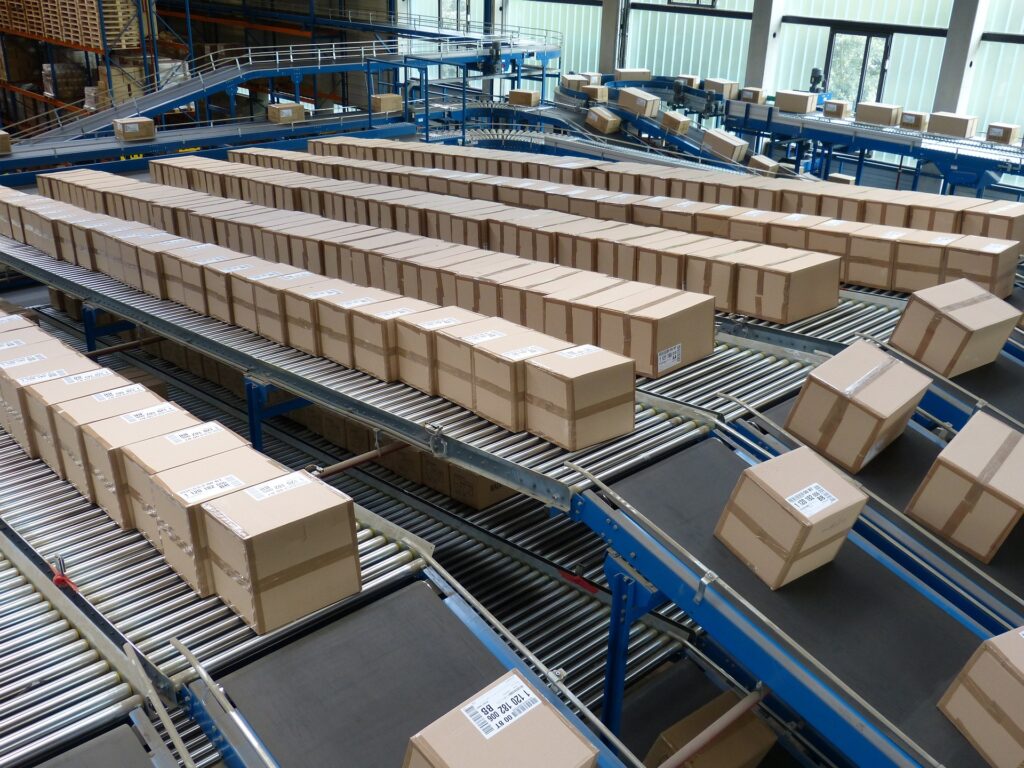
A modular belt conveyor is a versatile and efficient solution for transporting goods in various industries. With its modular design, this type of conveyor system allows for easy customization and flexibility to meet specific needs. The belt consists of individual interlocking modules that can be easily replaced or reconfigured, making maintenance and repairs a breeze. The modular belt conveyor offers excellent stability and smooth operation, ensuring a reliable and consistent flow of materials. It can handle a wide range of product sizes and weights, from small and lightweight items to heavy and bulky loads. Whether it’s moving packages in a distribution center or transporting raw materials in a manufacturing facility, the modular belt conveyor can handle the task with ease. Its robust construction and sturdy design make it suitable for both indoor and outdoor use, even in harsh environments. Furthermore, the modular belt conveyor can be equipped with various accessories and features, such as side guides, cleats, and diverters, to further enhance its functionality. This conveyor system is not only efficient but also cost-effective, as it requires minimal maintenance and offers long-term durability. Overall, the modular belt conveyor is a reliable and versatile solution that ensures smooth and efficient material handling operations.
I. What are modular belt conveyors?
1. Modular belt conveyors are conveyor systems that consist of individual plastic or metal modules, which are linked together to form a continuous belt.
– These modules can vary in shape, size, and material, depending on the specific requirements of the application.
– The modular design allows for easy assembly, disassembly, and reconfiguration, making them highly adaptable to changing production needs.
II. What are the applications of modular belt conveyors?
1. Food and beverage industry:
– Modular belt conveyors are widely used in the food and beverage industry for transporting products such as packaged goods, fruits, vegetables, and meat.
– The conveyor’s hygienic design, with smooth surfaces and easy-to-clean materials, ensures compliance with strict food safety regulations.
2. Manufacturing industry:
– In the manufacturing industry, modular belt conveyors are utilized to transport components, parts, and finished products between different stages of the production process.
– Their ability to handle heavy loads and withstand harsh operating conditions makes them ideal for various manufacturing applications.
3. Distribution and logistics:
– Modular belt conveyors are extensively used in distribution centers and warehouses for sorting, merging, and diverting products.
– The flexibility of the conveyor system allows for seamless integration with other automated systems, such as robotic arms or barcode scanners, enhancing efficiency and accuracy in order fulfillment.
III. What are the advantages of modular belt conveyors?
1. Increased productivity:
– The smooth and continuous movement of products on the modular belt conveyor minimizes downtime and bottlenecks in production.
– The ability to handle a wide range of product sizes and shapes eliminates the need for multiple conveyor systems, streamlining operations.
2. Ease of maintenance:
– Modular belt conveyors are designed for easy maintenance, with quick-release mechanisms for replacing damaged or worn-out modules.
– Routine maintenance tasks, such as cleaning and lubrication, can be performed efficiently, reducing equipment downtime.
3. Improved safety:
– The modular belt design ensures that products remain stable and secure during transportation, minimizing the risk of damage or accidents.
– Optional features, such as side guides and guardrails, provide additional protection for both operators and products.
IV. Important considerations when using modular belt conveyors:
1. Belt material selection:
– The choice of belt material should be based on the specific product being transported, considering factors such as temperature, moisture, and chemical resistance.
2. System integration:
– Proper integration of the modular belt conveyor with other equipment, such as sensors and control systems, is crucial for seamless operation and optimal performance.
3. Maintenance and cleaning protocols:
– Establishing regular maintenance schedules and implementing proper cleaning protocols will help ensure the longevity and reliability of the conveyor system.
Conclusion
Modular belt conveyors offer a flexible and efficient solution for transporting various products in diverse industries. Their modular design, wide range of applications, and numerous advantages make them a valuable asset in modern production and logistics environments. By considering important factors such as belt material selection, system integration, and maintenance protocols, businesses can optimize the performance and longevity of their modular belt conveyors, ultimately enhancing productivity and profitability.
